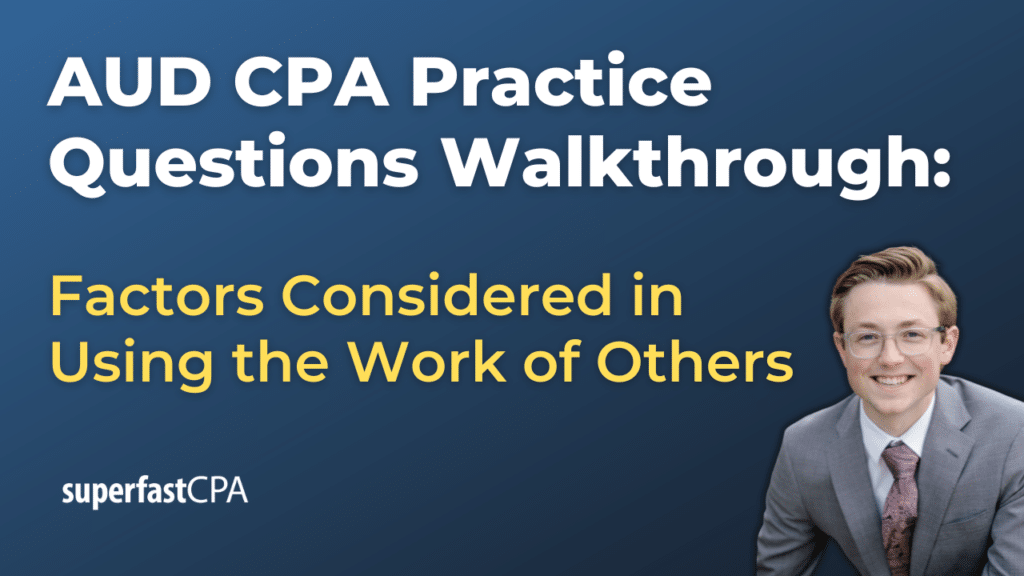In this video, we walk through 5 AUD practice questions teaching about factors considered in using the work of others. These questions are from AUD content area 2 on the AICPA CPA exam blueprints: Assessing Risk and Developing a Planned Response.
The best way to use this video is to pause each time we get to a new question in the video, and then make your own attempt at the question before watching us go through it.
Also be sure to watch one of our free webinars on the 6 “key ingredients” to an extremely effective & efficient CPA study process here…
Factors Considered in Using the Work of Others
In an external audit, the engagement team may consider relying on the work of internal auditors, auditor specialists, or management specialists to enhance efficiency and obtain relevant audit evidence. However, determining whether and how to use this work requires careful consideration of factors such as objectivity, competence, supervision, and judgment limitations. Let’s break down these key considerations with practical examples.
Assessing the Internal Audit Function: Objectivity and Competence
When evaluating whether to use the work of an internal audit function, external auditors must determine whether the internal auditors are:
- Objective: Do they report to those charged with governance rather than management? Are there any conflicts of interest that could compromise their independence?
- Competent: Do they have the necessary training, experience, and a track record of producing high-quality work? Are their past findings well-supported and in line with professional standards?
Example:
A company’s internal auditors report directly to the CFO and frequently assist with operational decision-making. This raises concerns about their objectivity, making their work less reliable for the external audit.
Supervision and Limitations of Internal Auditors’ Work
Even if internal auditors are competent and objective, the external auditor cannot rely on their work without supervision and review. Additionally, internal auditors cannot make judgment calls on significant audit matters.
Example:
An external auditor plans to use the internal audit team’s work in testing accounts payable balances. While this is acceptable, the external auditor must review their procedures and conclusions. However, the internal auditors cannot evaluate the reasonableness of complex accounting estimates—this remains the responsibility of the external auditor.
Who Qualifies as an Auditor’s Specialist?
An auditor’s specialist is someone with expertise outside of accounting or auditing that assists in gathering sufficient audit evidence. These specialists may include:
- Valuation experts (e.g., determining fair value of intangible assets)
- Actuaries (e.g., estimating pension liabilities)
- Legal experts (e.g., analyzing pending litigation)
- Engineers (e.g., assessing environmental liabilities)
Tax experts are NOT considered specialists in this context because taxation falls under the umbrella of accounting.
Example:
If an audit involves verifying the fair value of a company’s complex financial instruments, the external auditor may engage a valuation expert. However, they would not classify a tax consultant as a specialist, since tax expertise is considered part of accounting.
Evaluating the Work of an Auditor’s Specialist
Before relying on a specialist’s work, external auditors must:
- Understand the scope and objective of the specialist’s work.
- Assess their competency, including credentials, experience, and adherence to professional standards.
- Evaluate the appropriateness and reasonableness of their methods, assumptions, and conclusions.
Example:
An external auditor engages an actuary to estimate a company’s pension liability. The auditor reviews the actuary’s methodology and key assumptions to determine whether they are reasonable and supported by relevant data.
Considering the Objectivity of a Management Specialist
Management may also hire its own specialists, such as valuation experts or legal consultants. In these cases, external auditors must carefully assess potential bias and determine whether the specialist’s relationship with management could impair their objectivity.
Example:
A company hires an external valuation expert to appraise its real estate holdings. If this specialist frequently works with the company or has financial incentives tied to the valuation, the auditor must scrutinize their conclusions more closely.
Final Thoughts
Using internal auditors or specialists can help streamline an audit, but external auditors must critically evaluate their objectivity, competence, and the appropriateness of their work. By understanding these factors, auditors can determine the extent to which they can rely on such work and ensure compliance with professional auditing standards.













